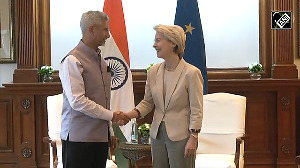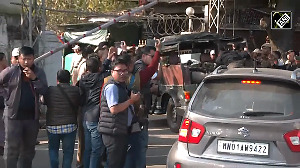Security forces in both countries have put in a huge amount of preparation work to prevent hooliganism involving English fans marring June's European soccer championship.
An estimated 50,000 English supporters are expected in Portugal, and numerous measures including banning 2,500 known troublemakers are planned to try to prevent a repeat of violence at the tournament in Belgium and the Netherlands four years ago.
 Europe's football governing body UEFA says similar scenes could lead to England being thrown out of the competition altogether.
Europe's football governing body UEFA says similar scenes could lead to England being thrown out of the competition altogether.
But two former hooligans say it may be only luck that prevents trouble in Portugal.
"The amount of people that purely go just for the violence...I would say 0.1 percent, but that's still 200 or 300 lads and they can cause a hell of a lot of trouble," said John Theone, an ex-hooligan who has written about his experiences following Premier League team Middlesbrough in his book "Frontline".
"You get people that don't understand English. We can't speak their language because we are an ignorant nation. You get misinterpreted words and it (violence) kicks off for the silliest reasons," he told Reuters.
Theone, 45, was at Charleroi in June 2000 when chair-throwing English and German fans clashed with Belgian riot police using water cannons in the town square.
He said a combination of drunk fans, provocative policing and encouragement from journalists had caused the trouble.
The fighting began, he said, when one drunk English fan, egged on by reporters, set fire to a German flag. Police tried to arrest him, the fan's equally drunken friends attacked the police and nearby Germans, and chaos followed.
"If a mob come at you, if I was over there (Portugal) I -- and I guess most England fans -- would get involved," Theone said.
SMALLER TEAMS
Theone said the police banning orders would have little effect as most related to fans of major clubs not the equally dangerous troublemakers who followed smaller teams.
"It won't stop anything. What they don't look at is the small provincial towns and the lads there are just as big as lads anywhere else," Theone said.
Mark Chester, 39, a founder of first division Stoke City's notorious "Naughty Forty" hooligan gang, says a problem this year could come from rival English "firms" of hooligans.
"I can't see who the hell they (the English fans) are going to fight European-wise apart from the Dutch and the Germans. Most of the guys that are travelling out there this summer are going to try and put all the domestics in order."
But there could still be trouble between rival foreign fans.
"I know for a fact that the Dutch and the Germans are planning a big one," Chester told Reuters. "Even the Swiss have got a firm together. It seems like the whole of Europe are getting little firms together."
Both men agree that much will depend on the policing, saying heavy-handed tactics in the past have often stoked up trouble.
The Portuguese have vowed to take a "fan-friendly" attitude, something Chester says works.
NEW GENERATION
While Britain has made efforts to stamp out hooliganism through tough new laws, Chester is in no doubt that violence is on the rise again.
Some of the "lads" were returning to the firms as their marriages broke up and their children left home, while a new, more frightening generation were emerging, he said.
"It's massive. It's certainly not going away. There are dark undercurrents now, especially with the influx of asylum-seekers and things like that, so people are tending to go back to the firms to reassure each other."
The new generation of hooligans were most likely to start trouble in Portugal, he said.
"In our day it was a bit of mischief -- it was a punch-up and laugh. These young kids have got a look in their eye that they shouldn't really have. They are all focused on the violent side of it -- these guys are hell bent on it."
Both Theone and Chester became engrossed with hooliganism as youngsters in the 1970s when fighting between rival firms in stadiums was commonplace as there was no fan segregation.
"I really wanted to become a football hooligan as a child. I actually believed I was defending our ground and our town from other people," said Chester, who gave a brutally honest account of his exploits in his book "Naughty".
Both men have turned their backs on the past. Chester says it now repulses him, while Theone, who is now disabled, says he is older and wiser.
"As you get older or a bit more mature you realise it's stupid to go and punch someone because he's got a different colour on or he's got a different coloured skin," he said.








 © 2025
© 2025